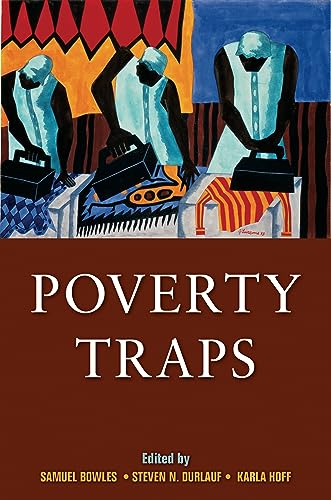Articles liés à Poverty Traps

Synopsis
Much popular belief--and public policy--rests on the idea that those born into poverty have it in their power to escape. But the persistence of poverty and ever-growing economic inequality around the world have led many economists to seriously question the model of individual economic self-determination when it comes to the poor. In Poverty Traps, Samuel Bowles, Steven Durlauf, Karla Hoff, and the book's other contributors argue that there are many conditions that may trap individuals, groups, and whole economies in intractable poverty. For the first time the editors have brought together the perspectives of economics, economic history, and sociology to assess what we know--and don't know--about such traps.
Among the sources of the poverty of nations, the authors assign a primary role to social and political institutions, ranging from corruption to seemingly benign social customs such as kin systems. Many of the institutions that keep nations poor have deep roots in colonial history and persist long after their initial causes are gone. Neighborhood effects--influences such as networks, role models, and aspirations--can create hard-to-escape pockets of poverty even in rich countries. Similar individuals in dissimilar socioeconomic environments develop different preferences and beliefs that can transmit poverty or affluence from generation to generation. The book presents evidence of harmful neighborhood effects and discusses policies to overcome them, with attention to the uncertainty that exists in evaluating such policies.Les informations fournies dans la section « Synopsis » peuvent faire référence à une autre édition de ce titre.
À propos de l?auteur
Samuel Bowles is Research Professor and Director of the Behavioral Sciences Program at the Santa Fe Institute, and Professor of Economics at the University of Siena. Steven N. Durlauf is Kenneth J. Arrow Professor of Economics at the University of Wisconsin, Madison. Karla Hoff is a Senior Research Economist at the World Bank.
Les informations fournies dans la section « A propos du livre » peuvent faire référence à une autre édition de ce titre.
EUR 6,47 expédition depuis Royaume-Uni vers Etats-Unis
Destinations, frais et délaisAcheter neuf
Afficher cet articleEUR 2,25 expédition vers Etats-Unis
Destinations, frais et délaisRésultats de recherche pour Poverty Traps
Poverty Traps
Vendeur : WorldofBooks, Goring-By-Sea, WS, Royaume-Uni
Paperback. Etat : Very Good. The book has been read, but is in excellent condition. Pages are intact and not marred by notes or highlighting. The spine remains undamaged. N° de réf. du vendeur GOR014453928
Quantité disponible : 1 disponible(s)
Poverty Traps
Vendeur : GreatBookPrices, Columbia, MD, Etats-Unis
Etat : New. N° de réf. du vendeur 24824702-n
Quantité disponible : 1 disponible(s)
Poverty Traps
Vendeur : PBShop.store US, Wood Dale, IL, Etats-Unis
PAP. Etat : New. New Book. Shipped from UK. Established seller since 2000. N° de réf. du vendeur WP-9780691170930
Quantité disponible : 1 disponible(s)
Poverty Traps
Vendeur : GreatBookPrices, Columbia, MD, Etats-Unis
Etat : As New. Unread book in perfect condition. N° de réf. du vendeur 24824702
Quantité disponible : 1 disponible(s)
Poverty Traps
Vendeur : PBShop.store UK, Fairford, GLOS, Royaume-Uni
PAP. Etat : New. New Book. Shipped from UK. Established seller since 2000. N° de réf. du vendeur WP-9780691170930
Quantité disponible : 1 disponible(s)
Poverty Traps
Vendeur : Books Puddle, New York, NY, Etats-Unis
Etat : New. pp. 256. N° de réf. du vendeur 26373200890
Quantité disponible : 1 disponible(s)
Poverty Traps
Vendeur : Lucky's Textbooks, Dallas, TX, Etats-Unis
Etat : New. N° de réf. du vendeur ABLIING23Feb2416190102860
Quantité disponible : Plus de 20 disponibles
Poverty Traps
Vendeur : Best Price, Torrance, CA, Etats-Unis
Etat : New. SUPER FAST SHIPPING. N° de réf. du vendeur 9780691170930
Quantité disponible : 2 disponible(s)
Poverty Traps
Vendeur : Majestic Books, Hounslow, Royaume-Uni
Etat : New. pp. 256. N° de réf. du vendeur 373893157
Quantité disponible : 1 disponible(s)
Poverty Traps
Vendeur : Rarewaves USA, OSWEGO, IL, Etats-Unis
Paperback. Etat : New. Much popular belief--and public policy--rests on the idea that those born into poverty have it in their power to escape. But the persistence of poverty and ever-growing economic inequality around the world have led many economists to seriously question the model of individual economic self-determination when it comes to the poor. In Poverty Traps, Samuel Bowles, Steven Durlauf, Karla Hoff, and the book's other contributors argue that there are many conditions that may trap individuals, groups, and whole economies in intractable poverty. For the first time the editors have brought together the perspectives of economics, economic history, and sociology to assess what we know--and don't know--about such traps. Among the sources of the poverty of nations, the authors assign a primary role to social and political institutions, ranging from corruption to seemingly benign social customs such as kin systems. Many of the institutions that keep nations poor have deep roots in colonial history and persist long after their initial causes are gone.Neighborhood effects--influences such as networks, role models, and aspirations--can create hard-to-escape pockets of poverty even in rich countries. Similar individuals in dissimilar socioeconomic environments develop different preferences and beliefs that can transmit poverty or affluence from generation to generation. The book presents evidence of harmful neighborhood effects and discusses policies to overcome them, with attention to the uncertainty that exists in evaluating such policies. N° de réf. du vendeur LU-9780691170930
Quantité disponible : Plus de 20 disponibles

